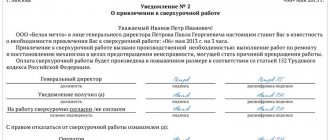Rights in relation to the inheritance received by the wife
Article 36 of the Family Code of the Russian Federation indicates that the property that belonged to each of a married couple before marriage, as well as movable and immovable property received separately by each, as a gift or as an inheritance, is the personal property of each.
That is, the husband is deprived of the right to own and dispose in any way of the inherited property belonging to the spouse.
For example, my wife inherited a house. In this case, she has the right to dispose of the house as she wants, without anyone’s consent. The husband has no right to dispose of this house.
Exceptions to inheritance rules
There is one exception to the provisions of Article 36 of the RF IC. Movable or immovable property that was transferred to the wife as an inheritance received during marriage can be recognized as joint common property only if a large sum of money was spent on this movable or immovable property and/or a large physical contribution was made, after which the value of the inherited property has grown significantly.
After recognition of the inheritance as common, the husband has the opportunity to own and dispose of it on an equal basis with his wife. Any legally significant actions with this movable or immovable property can only be carried out with the consent of both.
For example, a wife inherited an old and dilapidated house. The husband spent a lot of money and effort to restore it, after which the value of the house increased greatly. After this, he has the opportunity to own and dispose of this house on an equal basis with his wife.
In the case where married people are represented by the testator as a single heir, the estate becomes the joint property of the married couple. In this case, the standard rule applies: when carrying out any legally significant actions with this inheritance mass, the consent of both is required.
Division of inherited property during divorce
In practice, there are common cases when a divorcing couple, when dividing their movable and immovable property, tries to divide not only what they have acquired together, but also what they received before marriage, as well as what they inherited.
Due to the fact that this type of property is recognized as personal property, it is not subject to division, and the spouse does not have the opportunity to claim it.
The exception, as in the previous case, applies in circumstances where the husband spent a lot of money and effort to restore it, as a result of which the value of the real estate or movable inheritance has increased significantly. Then, in the legal process, the share of the spouse - not the heir - will be determined in proportion to his contribution to the given movable or immovable thing.
If we are talking about an inheritance that went to both spouses, the court also determines the share of each during the divorce process. As a general rule, the shares here are considered equal if there is no direct condition on the determination of the shares.
Sale of inherited property
The heir-wife can sell the property received at any time, and the proceeds will also be her personal property. During a divorce, this money will not be taken into account by the court for division, even if such a demand is made by the husband.
Other division options are possible if the funds are sent by the wife to purchase new property (for example, real estate). If the husband participates in the purchase by investing his own savings, or joint family money is used for the purchase, the property will be considered as joint or shared property of the spouses.
As part of the divorce process, the amount of additional investments will be established, as well as evidence of the allocation of funds from the husband or the family budget will be checked.
If the acquired property was registered in the name of common children, it will be excluded from division, even if both spouses invested their savings in equal shares.
Rights of the husband in relation to the inheritance of the deceased wife
If the spouse dies, after her death all property belonging to her during her lifetime is subject to division. The following types of property mass are subject to division:
- Half of all property acquired jointly with the spouse in the present marriage, unless otherwise provided by the marriage contract.
- Personal belongings and real estate that belonged to the deceased before marriage.
- Movable and immovable things that passed to the deceased by inheritance, both before marriage and during marriage.
The division of property belonging to the deceased is subject to division among all heirs in the order of priority established by law or determined by the will.
Order of succession
The order of inheritance after the death of a spouse is established as follows:
- Inheritance by law. The spouse, as the heir of the first stage, receives his share equally with the children of the deceased and her parents. If he is not the only heir, the entire estate of the deceased is divided equally among all the heirs in turn.
- Inheritance by will. If the deceased has made a will, according to which the husband is not included in the list of heirs, he has the opportunity to claim rights only in relation to the obligatory share of the inheritance. This share ranges from 50 percent and above. It is divided equally among all applicants for the obligatory share. These include children, parents of the deceased and her disabled dependents. The remainder of the inheritance is divided equally among all persons named in the will.
Exceptions to inheritance rules
Even if the husband of the deceased is not included in the will, he has the following preferential rights:
- The ability to retain a share of property that a married couple acquired while married;
- The ability to allocate the inheritance share due to him without participating in legal proceedings. Then it will be enough for the deceased’s husband to obtain a certificate confirming ownership of the estate.
Thus, regardless of family disputes, the husband has priority right of inheritance after the deceased wife, regardless of whether he was included in the will or not. The size of the share depends only on the number of other persons claiming the inheritance.
How to register an inheritance?
To receive an inheritance, the spouse must visit a notary and submit an application for acceptance of the inheritance. You must contact a notary office, which is located at the place of residence or registration of the deceased. In most cases, these addresses are the same.
The application for acceptance of inheritance is written in any form, but must contain the following information:
- Information about the notary office in which the inheritance case has been opened.
- Personal information about the deceased spouse, the address of her last place of residence.
- Date of death of the testator.
- Death certificate details.
- Information about heirs.
- The desire to accept an inheritance.
- Information about the wife's property.
- Confirmation of the presence of family relationships.
- List of attached papers.
- Date of application and signature.
Along with the application, the following documents must be presented to the notary:
- Heir's passport.
- Certificate confirming the fact of death.
- Certificate of the testator's last residential address.
- Documents for the property of the deceased wife.
- Marriage certificate.
Additional paperwork may be required if necessary. After examining the submitted documents, the notary issues a certificate of inheritance. After receiving it, the husband becomes the owner of his share of the wife's property. If the property is real estate, the ownership of it must be re-registered at the Rosreestr branch.
Inheritance when spouses make a joint will
Husbands and wives have been able to make a joint will since November 2015. A joint will can only include movable or immovable property that was acquired during the marriage relationship. Accordingly, all legally significant actions and decisions in relation to him must be taken with the consent of both spouses.
A special feature of this type of will is the fact that it can only be renounced during the lifetime of both spouses. This provision secures the protection of the right to freely dispose of the property mass, since the spouse is a joint owner. A will of this type can only be renounced with notarial confirmation.
In the case where the spouses have drawn up a joint will, the husband inherits the property share of the deceased spouse by legal right. At the same time, he does not have the right to dispose of this property mass, i.e. alienate it in whole or in parts. This is provided for by the imposed notarial prohibition. After the death of the surviving spouse, the entire estate will be divided by the persons designated by the will.
The rights of a cohabitant to the inheritance of a common-law wife
If the marriage between a man and a woman has not been officially registered, regardless of the time of cohabitation, such persons do not have the right to inherit by law from each other. That is, a cohabitant cannot make claims to inherit according to the law of the cohabitant after her death, since this category of relationship is not included in any of the inheritance lines.
An illegitimate husband can receive an inheritance only on the condition that the common-law wife indicated his name in the will. Moreover, if there are persons who claim a mandatory share of the property mass, the illegitimate husband will receive only that part of the inheritance that remains after the allocation of the mandatory shares.
Persons who may be heirs
There are two categories of cohabitants who can claim legal inheritance:
- Disabled partner. If he has been supported/dependent by his common-law wife for a year or more, he has the right to claim a mandatory share of the inheritance, even if his name is not indicated in the will.
- A cohabitant is a dependent. Such a person has the right to receive the entire inheritance mass only on the condition that the common-law wife has no claimants to the inheritance mass from the first to the seventh stage. If the eighth stage has become a priority, the common-law husband, a dependent, receives the entire inheritance mass.
Thus, regardless of the time the common-law wife received the inheritance, it does not become common property with the cohabitant, so he does not have the opportunity to claim.
A cohabitant can make claims against the inheritance only if he has spent a lot of money and effort on restoring the inherited property, as a result of which the cost has increased significantly. But these circumstances will need to be proven in court.
Thus, the scope of the husband’s rights to the inherited property of the deceased spouse depends on the status of the marriage (official or not), as well as on whether it is indicated in the will or not. Each case is considered separately in court.
Your rating of the article
How to change personal property regime
Having received an inheritance, the wife can change the personal property regime voluntarily - by drawing up a marriage contract or making a transaction with her husband. The wife can at any time sell or give her husband all or part of the inherited property. In this case, the subject of the purchase and sale transaction will become the joint property of the married couple and will be divided on a general basis, and the gift will remain the personal property of the husband.
Let's consider the procedure for concluding a marriage contract if its subject is inherited property. To do this, you must follow the following rules:
- the partners must come to a mutual agreement on the procedure for resolving property issues - what property, and in what shares, will be distributed between the spouses, including in the event of a possible divorce;
- the agreed conditions are set out in writing, this is exactly the form of the marriage contract provided for by the RF IC;
- In order for the marriage contract to come into force, it must be certified by a notary office.
The notary checks the legal capacity of both spouses and their ability to understand what is happening. In addition, the absence of facts of coercion, threat or fraud during the execution of the marriage agreement is verified.
The text of the marriage contract may provide for the re-registration of rights to inherited property during family relations, or indicate the procedure for division in case of divorce. Please note that unilateral refusal to execute a marriage agreement is unacceptable, except in cases expressly specified by law (for example, if the specified document is invalid). For this reason, it is necessary to carefully weigh all the possible consequences of this option for resolving property issues.
If there is a marriage contract, divorce occurs as follows:
- in the absence of objections from the parties, property is divided in strict accordance with the clauses of the agreement;
- if one of the spouses evades fulfillment of the agreement or refuses to follow its provisions, a lawsuit is filed;
- the court divides the property under the terms of the marriage contract, after which the decision will be enforced.
By mutual consent of the spouses, changes can be made to the marriage agreement at any time. For example, if, within the framework of family relationships, spouses received property by inheritance several times, you can foresee in advance the procedure for turning it into joint property, or make changes to the marriage contract each time.
A marriage contract drawn up under duress, threat, violence or misrepresentation may be declared invalid by a court of law. If such facts are proven by the interested party, all property will again return to the personal property of the heir-spouse.
Can a husband claim his wife’s inheritance if this issue is not regulated in the marriage contract? This possibility exists only if, at the expense of the general family budget or the husband’s personal savings, the inherited property has been significantly improved. Let us consider the features of proving this fact.








